Natalie ShermanBBC News, Fall River, Massachusetts
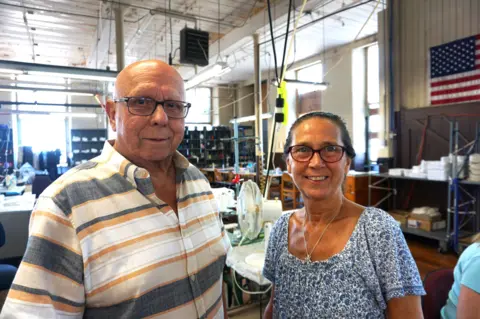 BBC
BBCIn a corner of a cavernous 1890s factory in southern Massachusetts, 15 people are bent over sewing machines, churning out specialty, hospital-grade neonatal gear.
They are all that remain of what was once a much bigger manufacturing operation, most of which the Teixeira family shut down in 1990, reinventing their business as a largely warehousing and distribution business.
Since US President Donald Trump started rolling out sweeping tariffs, the Teixeiras have been fielding more inquiries from companies newly interested in their US-based sewing services.
But they have turned down those offers, deterred by the difficulty of hiring in the midst of an immigration crackdown and doubts that the demand will be sustained.
It’s just one of the many indications that achieving the manufacturing revival promised by the president is likely to be far more difficult than the White House has claimed.
“It’s just not going to happen,” said Frank Teixeira, who joined the family business in the 1970s and oversaw its dismantling and reinvention as Accurate Services Inc.
“Tariffs are a bad policy and eventually are going to come home to haunt us.”
Trump campaigned for the presidency on the promise of a better economy, engineered in part by tariffs that he said would lower costs and usher in a new golden age.
The message proved to resonate with voters, helping the campaign make unexpected inroads in working-class areas long considered Democratic strongholds.
That includes the Teixeiras’ base of Fall River, a former textile manufacturing hub, where Trump’s win marked the first in the city by a Republican presidential candidate in roughly a century.
But his plans were widely panned by experts, who warned that the tariffs, which are a tax on imports, would instead raise prices for American businesses and consumers and slow growth – with particular risks for manufacturers, who often rely on imported supplies.
Now nine months into the president’s term as the tariffs take hold, the gulf between Trump’s rhetoric, which boasts of investments pouring into the country, and the reality on the ground in places like Fall River, is starting to show.
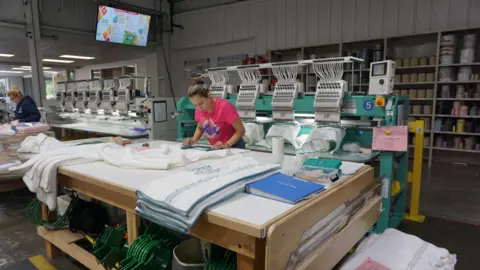
Employment growth in the US has slowed precipitously this year, including in manufacturing. After expanding after the pandemic, payrolls at manufacturing firms have shrunk this year, shedding 12,000 jobs last month alone.
Business surveys indicate that activity in the sector is in contraction.
Last month, 71% of manufacturers questioned by the Dallas branch of the Federal Reserve said the tariffs – which range from 10% to 50% on most imports – had already had a negative impact on their business, raising the cost of resources and hurting profits.
At Matouk, a maker of high-end bedding up the road from the Teixeiras’, boss George Matouk said that between April and August tariffs had already added more than $100,000 (£74,000) a month in costs, as they hit supplies like cotton fabric from India and Portugal and down from Liechtenstein.
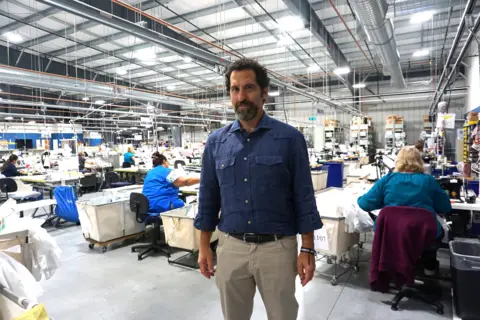
Founded by his grandfather in 1929, the company has grown to employ about 300 people in recent years – a point of pride for Mr Matouk, who faced naysayers when he returned as the third generation to join the family business after graduating from Columbia Business School in the late 1990s.
But the sudden tariff expense has forced the firm to cut investments on things such as new equipment and spending on discretionary items like marketing.
Despite the made-in-America distinction of many of his products, Mr Matouk said he expected no benefits from the tariffs because higher costs were pushing him to raise prices, a move likely to weigh on sales.
“Because the materials are subject to tariffs just like everything else, the benefits are not there,” he said.
Mr Matouk called the current challenges faced by his firm “demoralising in a new way”, since they have been inflicted deliberately, by government policy.
“We’ve done all of the things we were supposed to do in order to invest in the industrial base of the United States when no one else was willing to do it and it’s just really frustrating that now we’re being penalised,” he said.
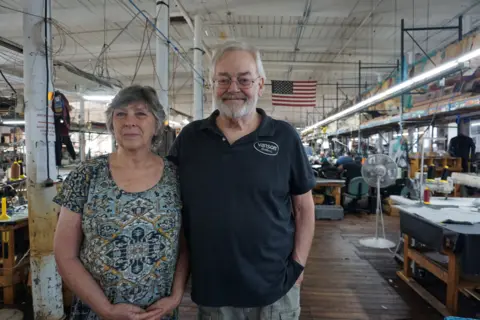
Studies on the impact of the more limited tariffs imposed by Trump during his first term on manufacturers in the US have found that small job gains in protected industries, like steel, were more than offset by losses at other firms that were dependent on parts.
But Mike van der Sleesen, who runs motorcycle jacket business Vanson Leathers, said he thought the changes this year had been so disruptive that it was premature to make predictions.
Mr van der Sleesen, who voted for Trump last year, is no fan of the president’s tariffs, which have driven up his costs some 15% this year.
However, he shared the president’s concerns that foreign companies could easily access the US market, while US firms looking to sell abroad encounter hurdles in the form of tariffs and other taxes.
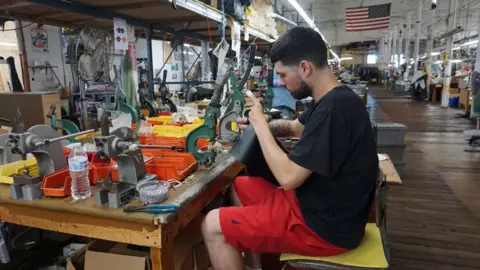
“It’s been a very uneven and unfair trade path for a company like Vanson,” said Mr van der Sleesen, whose business was founded in 1974 and employed more than 160 people as recently as 2000, before the wallop of China’s entry into the global order shrunk the workforce to about 50.
“We shouldn’t charge them and they shouldn’t charge us in my view but that’s never going to happen,” he said.
For now, demand for his jackets, which can sell for thousands of dollars, has held up. He said his suppliers in the US were reporting an uptick in activity.
“We haven’t heard overtime in the textile world for 20 years!” he said. “It’s hard to be confident that you can predict what it’s going to shake out to be because the changes have been so dramatic.”
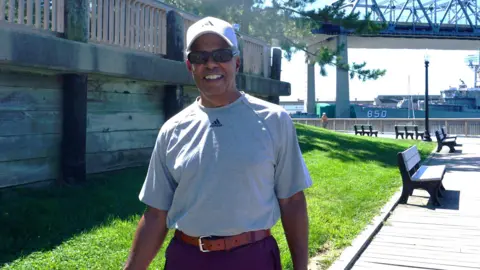
On the streets of Fall River, many Trump supporters said they remained willing to give the president time to put his strategy to the test.
“We should be able to manufacture,” said Tom Teixeira.
The 72-year-old retired transit worker voted for Trump in 2016, 2020 and 2024, won over in part by his message on the economy.
“I know how it was and it can improve but it’s not going to improve overnight,” said Mr Teixeira, who is not related to the Teixeira manufacturers, adding that he had yet to notice any major price increases this year.
“A year from now, if things aren’t cheaper, we’ll see.”
www.bbc.com (Article Sourced Website)
#Donald #Trumps #tariffs #put #manufacturing #revival #hopes #test

